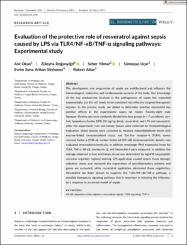Evaluation of the protective role of resveratrol against sepsis caused by LPS via TLR4/NF-κB/TNF-α signaling pathways: Experimental study

Göster/
Erişim
info:eu-repo/semantics/embargoedAccessTarih
2023Yazar
Okan, AslıDoğanyiğit, Züleyha
Yılmaz, Seher
Uçar, Sümeyye
Arıkan Söylemez, Evrim Suna
Attar, Rukset
Üst veri
Tüm öğe kaydını gösterKünye
Okan, A., Doğanyiğit, Z., Yilmaz, S., Uçar, S., Arikan Söylemez, E. S., & Attar, R. Evaluation of the protective role of resveratrol against sepsis caused by LPS via TLR4/NF‐κB/TNF‐α signaling pathways: Experimental study. Cell Biochemistry and Function.Özet
The development and progression of sepsis are multifactorial and influence the immunological, endocrine, and cardiovascular systems of the body. Our knowledge of the key mechanisms involved in the pathogenesis of sepsis has expanded exponentially, yet this still needs to be translated into effective targeted therapeutic regimes. In the present study, we aimed to determine whether resveratrol has positive effects in the experimental sepsis rat model. Twenty-eight male Spraque-Dawley rats were randomly divided into four groups (n = 7) as follows: control, lipopolysaccharide (LPS) (30 mg/kg dose), resveratrol, and LPS and resveratrol. After the experiment, liver and kidney tissues were collected for histopathological evaluation, blood serums were collected to measure malondialdehyde levels with enyzme-linked immunosorbent assay, and Toll-like receptor-4 (TLR4), tumor necrosis factor-α (TNF-α), nuclear factor-κB (NF-κB) immunoreactivity density was evaluated immunohistochemically. In addition, messenger RNA expression levels for TLR4, TNF-α, NF-κB, interleukin-1β, and interleukin 6 were measured. In addition, the damage observed in liver and kidney tissue was determined by AgNOR (argyrophilic nucleolar organizer regions) staining. LPS application caused severe tissue damage, oxidative stress, and increased the expressions of proinflammatory proteins and genes we evaluated, while resveratrol application eliminated these negativities. Resveratrol has been proven to suppress the TLR4/NF-κB/TNF-α pathway, a possible therapeutic signaling pathway that is important in initiating the inflammatory response in an animal model of sepsis.















